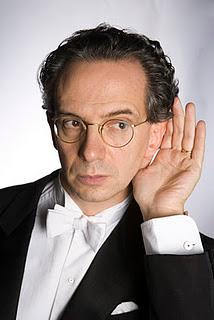Fabio Luisi leads the Vienna Symphony at Lincoln Center.

A conductor, always on call: Fabio Luisi.
Photo by Barbara Luisi.
Sunday's matinee concert featuring the Vienna Symphony offered New Yorkers a chance to see conductor Fabio Luisi in one of the jobs he held before becoming Principal Conductor at the Metropolitan Opera. Mr. Luisi is Chief Conductor of this Viennese ensemble. He offered orchestral comfort food: Rachmaninoff's Piano Concerto No. 2 (with soloist Lise de la Salle), paired with Beethoven's reliable Seventh Symphony.
As originally scheduled, this program was more interesting. Mr. Luisi had scheduled this concert (the first of two) to end with Franz Schmidt's impressive but rarely played Symphony No. 4. But in a late change, the Schmidt yielded to the more familiar Beethoven. This might have been due to Mr. Luisi's other commitments.
In September, Mr. Luisi was promoted at the Met, following an injury suffered by reigning Met Music Director James Levine. On short notice, Mr. Luisi added the company's new productions of Don Giovanni and Siegfried to his already full schedule. In doing so, he was forced to cancel a number of European commitments, including a new Rome production of Salome and (presumably) the time reqired to rehearse the Schmidt Fourth.
These are familiar, "safe" favorites were played and executed with thorough professionalism by the Vienna Symphony. While lacking the name-recognition of the Vienna Philharmonic, the two orchestras have some things in common. Both give concerts at the Musikverein, with the Symphony also playing at the Theater an der Wien. They share a preference for the traditional Viennese horn in F, and a relatively low proportion of females onstage.
The solo part in the Rachmaninoff was taken by Ms. de la Salle, a 23-year-old pianist of formidable talent and technique. She established the bell-like opening interval with a firm hand, before rolling forward into the opening theme. Balance problems existed in this movement, with Mr. Luisi's accompaniment drowning out the piano's voice in the opening phrases. Eventually, the problem was corrected and the piano's voice emerged over the orchestra.
The second movement was better, allowing the grace of Ms. de la Salle's playing to emerge. She exchanged thoughtful commentary with the solo clarinet, playing one of Rachmaninoff's most famous themes. Mr. Luisi brought out the melancholy character of this movement, indulging in some very Russian-sounding orchestral reflections, played with Austrian polish and tone.
The final Allegro allowed the talents of this young artist to shine fully, with thrilling, sometimes staccato keyboard runs She displayed the necessary blend of precision, force and athleticism needed with this composer's challenging piano parts. Ms. de la Salle then obliged the thunderous approval with an encore, a delicate, almost gossamer performance of Debussy's prelude Des pas sur la Niege ("Footprints in the Snow.")
Mr. Luisi then had the opportunity to show his orchestra's chops with a robust Beethoven Seventh. The opening had the right drama and power, providing contrast to the manic main theme that followed. Conducting without a score, the slender maestro danced in rhythm on the podium. At times, he seemed to pull Beethoven's dancing themes out of the strings with his whole body and will.
The funeral march (made famous in last year's Oscar™-winning The King's Speech was played with weight and a steady hand. The last two movements, expressions of joy at the defeat of Beethoven's idol-turned-nemesis Napoleon, had a celebratory air, with triumphant playing from the Vienna horns.

